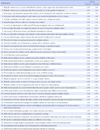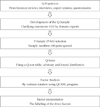Abstract
Purpose
Individuals' view of multiculturalism can be varied. The purpose of this study was to survey subjective view of and attitude toward multiculturalism in first-year undergraduate nursing students who had completed a multicultural subject.
Methods
The Q methodology, which integrates quantitative andqualitative methods, was used. Forty one Q-statements selected from each of the 40 participants were classified into theshape of normal distribution using a nine-point scale. The collected data were analyzed using the QUANL program.
Figures and Tables
Table 1
Q-Statements and Z-Score Array (N=40)

Table 2
Eigenvalue, Variance, and Characteristics of Participants (N=40)

Table 3
Differences and Consensus between Factors

References
1. Lee IS, Cho JY. A study on the cultural competency and demand for a multicultural education program among nursing college students. J Korea Acad Ind Coop Soc. 2014; 15(1):283–290. DOI: 10.5762/KAIS.2014.15.1.283.

2. Seo JY, Choi GY. The multicultural awareness and need for multicultural education of nursing students. J Korean Soc Multicult Health. 2012; 2(1):25–32.
3. Ministry of Security and Public Administration. 2014 security and public administration statistical yearbook [Internet]. Seoul: Ministry of Security and Public Administration;2014. cited 2015 March 20. Available from: http://www.mogaha.go.kr/html/site/frt/a01/search/search.jsp?search_cat=%2Fhtml%2Fsite%2Ffrt%2Fa01%2Fsearch%2Fsearch.jsp&search_txt=2014+%EC%95%88%EC%A0%84%ED%96%89%EC%A0%95%ED%86%B5%EA%B3%84%EC%97%B0%EB%B3%B4&x=15&y=15.
4. Korean Statistical Information Service. Statistics for legal foreign residents [Internet]. Seoul: Korean Statistical Information Service;2014. cited 2015 January 11. Available from: http://kosis.kr/news/news_01Detail.jsp?p_id=542.
5. Oh WO. Factors influencing cultural sensitivity among nursing students. J Korean Acad Child Health Nurs. 2011; 17(4):222–229. DOI: 10.4094/jkachn.2011.17.4.222.

6. Kim MJ. A comparison study on multicultural attitude and relating factors of nursing college students and non-nursing major students in Korea. J Korea Acad Ind Coop Soc. 2014; 15(4):2310–2319. DOI: 10.5762/KAIS.2014.15.4.2310.

7. Oh WO, Jeong WS, Kang HG, Kim EH, Seok MH. Cultural knowledge, empathy and cultural sensitivity of university students majoring in health and welfare. J Korean Soc Sch Health. 2010; 23(2):192–199.
8. Taylor G, Papadopoulos I, Dudau V, Maerten M, Peltegova A, Ziegler M. Intercultural education of nurses and health professionals in Europe (IENE). Int Nurs Rev. 2011; 58(2):188–195. DOI: 10.1111/j.1466-7657.2011.00892.x.

9. Koh CK, Koh SK. Married female migrants' experiences of health care services. J Korean Acad Soc Nurs Educ. 2009; 15(1):89–99.

10. Lee NY, Lee EN, Park EY. The attitudes of nurses toward multicultural families. J Korean Acad Soc Nurs Educ. 2013; 19(2):241–250. DOI: 10.5997/jkasne.2013.19.2.241.

11. Ruddock HC, Turner de S. Developing cultural sensitivity: Nursing students' experiences of a study abroad programme. J Adv Nurs. 2007; 59(4):361–369. DOI: 10.1111/j.1365-2648.2007.04312.x.

12. Kim KS, Yu M. The influencing factors associated cultural awareness of immigrants for marriage, foreign workers in Korean nursing students. Korean J Adult Nurs. 2012; 24(5):531–539. DOI: 10.7475/kjan.2012.24.5.531.

13. Salman A, McCabe D, Easter T, Callahan B, Goldstein D, Smith TD, et al. Cultural competence among staff nurses who participated in a family-centered geriatric care program. J Nurses Staff Dev. 2007; 23(3):103–111. DOI: 10.1097/01.NND.0000277179.40206.be.

14. Kim SH. Transcultural self-efficacy and educational needs for cultural competence in nursing of Korean nurses. J Korean Acad Nurs. 2013; 43(1):102–113. DOI: 10.4040/jkan.2013.43.1.102.

15. Wittig DR. Knowledge, skills and attitudes of nursing students regarding culturally congruent care of native Americans. J Transcult Nurs. 2004; 15(1):54–61. DOI: 10.1177/1043659603260036.

16. Peek EH, Park CS. Effects of a multicultural education program on the cultural competence, empathy and self-efficacy of nursing students. J Korean Acad Nurs. 2013; 43(5):690–696.

17. Cagle CS. Student understanding of culturally and ethically responsive care: Implications for nursing curricula. Nurs Educ Perspect. 2006; 27(6):308–314.
18. Krainovich-Miller B, Yost JM, Norman RG, Auerhahn C, Dobal M, Rosedale M, et al. Measuring cultural awareness of nursing students: A first step toward cultural competency. J Transcult Nurs. 2008; 19(3):250–258.
19. Kim DH, Kim SE. Cultural competence and factors influencing cultural competence in nursing students. J Korean Acad Psychiatr Ment Health Nurs. 2013; 22(3):159–168. DOI: 10.12934/jkpmhn.2013.22.3.159.

20. Hughes KH, Hood LJ. Teaching methods and an outcome tool for measuring cultural sensitivity in undergraduate nursing students. J Transcult Nurs. 2007; 18(1):57–62. DOI: 10.1177/1043659606294196.

21. Kim JH. A study about cultural sensitivity and stereotype about immigrant women among nursing students. J Digit Converg. 2014; 12(7):305–314. DOI: 10.14400/JDC.2014.12.7.305.

22. Akhtar-Danesh N, Baumann A, Cordingley L. Q-methodology in nursing research: A promising method for the study of subjectivity. West J Nurs Res. 2008; 30(6):759–773. DOI: 10.1177/0193945907312979.
23. Ha EH. Attitudes toward video-assisted debriefing after simulation in undergraduate nursing students: An application of Q methodology. Nurse Educ Today. 2014; 34(6):978–984. DOI: 10.1016/j.nedt.2014.01.003.

24. Kim HK. Q methodology: Philosophy, theories, analysis, and application. Seoul: Communication Books;2008. p. 449.
25. Ballestas HC, Roller MC. The effectiveness of a study abroad program for increasing students' cultural competence. J Nurs Educ Pract. 2013; 3(6):125–133. DOI: 10.5430/jnep.v3n6p125.

26. Rew L, Becker H, Cookston J, Khosropour S, Martinez S. Measuring cultural awareness in nursing students. J Nurs Educ. 2003; 42(6):249–257.

27. El Amouri S, O'Neill S. Leadership style and culturally competent care: Nurse leaders' views of their practice in the multicultural care settings of the United Arab Emirates. Contemp Nurse. 2014; 48(2):135–149. DOI: 10.1080/10376178.2014.11081936.

28. Kim JH, Park SJ, Lee IS. The current situation and the direction of urban multi-cultural education. Multicult Educ Stud. 2009; 2(2):43–68.
29. Balzora S, Abiri B, Wang XJ, McKeever J, Poles M, Zabar S, et al. Assessing cultural competency skills in gastroenterology fellowship training. World J Gastroenterol. 2015; 21(6):1887–1892. DOI: 10.3748/wjg.v21.i6.1887.

30. Kim YH. Diversification in Korea and cultural competence in social welfare. Korean J Soc Welf Stud. 2007; 35:117–144.




 PDF
PDF ePub
ePub Citation
Citation Print
Print




 XML Download
XML Download